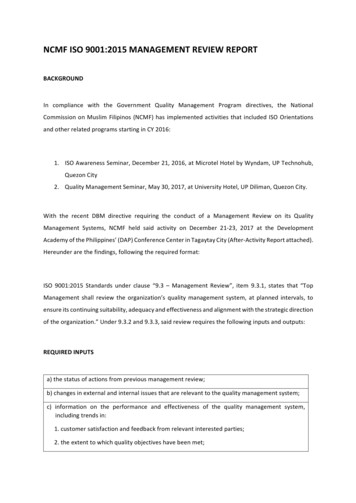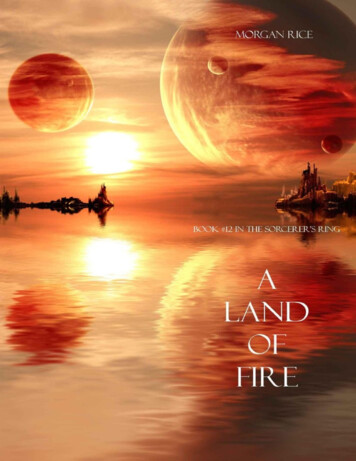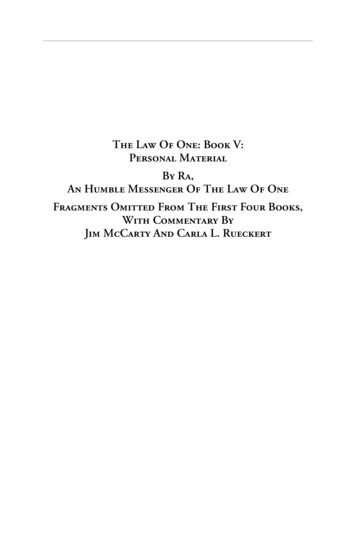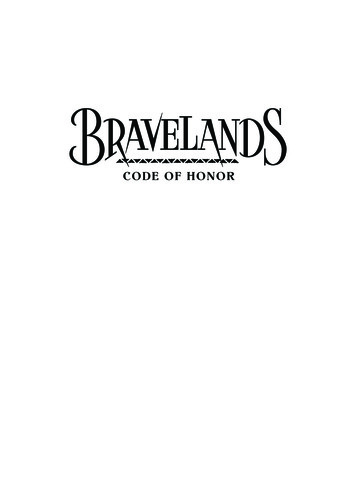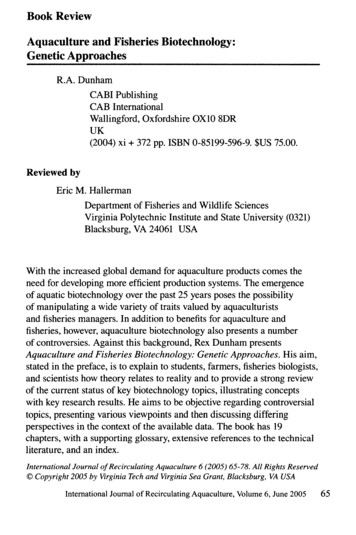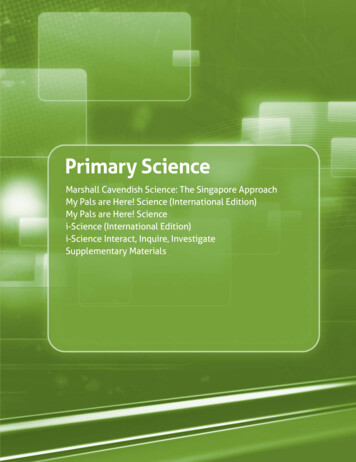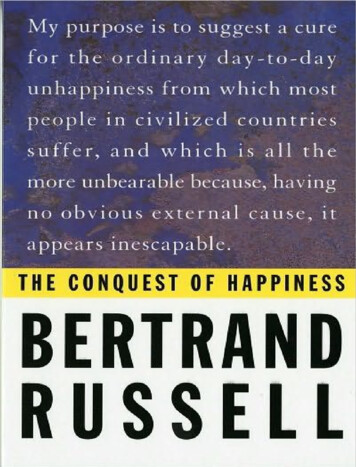
Transcription
This book is not addressed to the learned, or tothose who regard a practical problem merely assomething to be talked about. No profoundphilosophy or deep erudition will be found in thefollowing pages. I have aimed only at puttingtogether some remarks which are inspired by whatI hope is common sense. All that I claim for therecipes offered to the reader is that they are suchas are confirmed by my own experience andobservation, and that they have increased my ownhappiness whenever I have acted in accordancewith them. On this ground I venture to hope thatsome among those multitudes of men and womenwho suffer unhappiness without enjoying it, mayfind their situation diagnosed and a method, ofescape suggested. It is in the belief that manypeople who are unhappy could become happy bywell-directed effort that I have written this book.
Part I: Causes ofUnhappiness
Chapter 1: What makespeople unhappy?Animals are happy so long as they have health andenough to eat. Human beings, one feels, ought tobe, but in the modern world they are not, at least ina great majority of cases. If you are unhappyyourself, you will probably be prepared to admitthat you are not exceptional in this. If you arehappy, ask yourself how many of your friends areso. And when you have reviewed your friends,teach yourself the art of reading faces; makeyourself receptive to the moods of those whom youmeet in the course of an ordinary day.a in every face I meet,Marks of weakness, marks of woe,says Blake. Though the kinds are different, youwill find that unhappiness meets you everywhere.Let us suppose that you are in New York, in NewYork, the most typically modern of great cities.
Stand in a busy street during working hours, or ona main thoroughfare at a week-end, or at a dance ofan evening; empty your mind of your own ego, andlet the personalities of the strangers about you takepossession of you one after another. You will findthat each of these different crowds has its owntrouble. In the work-hour crowd you will seeanxiety, excessive concentration, dyspepsia, lackof interest in anything but the struggle, incapacityfor play, unconsciousness of their fellow creatures.On a main road at the week-end you will see menand women, all ‘comfortably off, and some veryrich, engaged in the pursuit of pleasure. Thispursuit is conducted by all at a uniform pace, thatof the slowest car in the procession; it isimpossible to see the road for the cars, or thescenery, since looking aside would cause anaccident; all the occupants of all the cars areabsorbed in the desire to pass other cars, whichthey cannot do on account of the crowd; if theirminds wander from this preoccupation, as willhappen occasionally to those who are notthemselves driving, unutterable boredom seizes
upon them and stamps their features with trivialdiscontent. Once in a way a car-load of colouredpeople will show genuine enjoyment, but willcause indignation by erratic behaviour, andultimately get into the hands of the police owing toan accident: enjoyment in holiday time is illegal.Or, again, watch people at a gay evening. All comedetermined to be happy, with the kind of grimresolve with which one determines not to make afuss at the dentist’s. It is held that drink and pettingare the gateways to joy, so people get drunkquickly, and try not to notice how much theirpartners disgust them. After a sufficient amount ofdrink, men begin to weep, and to lament howunworthy they are, morally, of the devotion of theirmothers. All that alcohol does for them is toliberate the sense of sin, which reason suppressesin saner moments .The causes of these various kinds of unhappinesslie partly in the social system, partly in individualpsychology — which, of course, is itself to a
considerable extent a product of the social system.I have written before about the changes in thesocial system required to promote happiness.Concerning the abolition of war, of economicexploitation, of education in cruelty and fear, it isnot my intention to speak in this volume.To discover a system for the avoidance of war is avital need for our civilisation; but no such systemhas a chance while men are so unhappy that mutualextermination seems to them less dreadful thancontinued endurance of the light of day. To preventthe perpetuation of poverty is necessary if thebenefits of machine production are to accrue in anydegree to those most in need of them; but what isthe use of making everybody rich if the richthemselves are miserable? Education in crueltyand fear is bad, but no other kind can be given bythose who are themselves the slaves of thesepassions. These considerations lead us to theproblem of the individual: what can a man orwoman, here and now, in the midst of our nostalgicsociety, do to achieve happiness for himself or
herself? In discussing this problem, I shall confinemy attention to those who are not subject to anyextreme cause of outward misery. I shall assume asufficient income to secure food and shelter,sufficient health to make ordinary bodily activitiespossible. I shall not consider the great catastrophessuch as loss of all one’s children, or publicdisgrace. There are things to be said about suchmatters, and they are important things, but theybelong to a different order from the things that Iwish to say. My purpose is to suggest a cure for theordinary day-to-day unhappiness from which mostpeople in civilised countries suffer, and which isall the more unbearable because, having noobvious external cause, it appears inescapable. Ibelieve this unhappiness to be very largely due tomistaken views of the world, mistaken ‘ethics,mistaken habits of life, leading to destruction ofthat natural zest and appetite for possible thingsupon which all happiness, whether of men oranimals, ultimately depends. These are matterswhich lie within the power of the individual, and Ipropose to suggest the changes by which his
happiness, given average good fortune, may beachieved.Perhaps the best introduction to the philosophywhich I wish to advocate will be a few words ofautobiography. I was not born happy. As a child,my favourite hymn was: ‘Weary of earth and ladenwith my sin’. At the age of five, I reflected that, if Ishould live to be seventy, I had only endured, sofar, a fourteenth part of my whole life, and I felt thelong-spreadout boredom ahead of me to be almostunendurable. In adolescence, I hated life and wascontinually on the verge of suicide, from which,however, I was restrained by the desire to knowmore mathematics.Now, on the contrary, I enjoy life; I might almostsay that with every year that passes I enjoy it more.This is due partly to having discovered what werethe things that I most desired and having graduallyacquired many of these things. Partly it is due tohaving successfully dismissed certain objects ofdesire - such as the acquisition of indubitable
knowledge about something or other - asessentially unattainable. But very largely it is dueto a diminishing preoccupation with myself.Like others who had a Puritan education, I had thehabit of meditating on my sins, follies, andshortcomings. I seemed to myself - no doubt justly- a miserable specimen.Gradually I learned to be indifferent to myself andmy deficiencies; I came to centre my attentionincreasingly upon external objects: the state of theworld, various branches of knowledge, individualsfor whom I felt affection. External interests, it istrue, bring each its own possibility of pain: theworld may be plunged in war, knowledge in somedirection may be hard to achieve, friends may die.But pains of these kinds do not destroy theessential quality of life, as do those that springfrom disgust with self. And every external interestinspires some activity which, so long as theinterest remains alive, is a complete preventive ofennui. Interest in oneself, on the contrary, leads to
no activity of a progressive kind. It may lead to thekeeping of a diary, to getting psycho-analysed, orperhaps to becoming a monk. But the monk will notbe happy until the routine of the monastery hasmade him forget his own soul. The happinesswhich he attributes to religion he could haveobtained from becoming a crossing-sweeper,provided he were compelled to remain one.External discipline is the only road to happinessfor those unfortunates whose self-absorption is tooprofound to be cured in any other way.The psychological causes of unhappiness, it isclear, are many and various. But all havesomething in common. The typical unhappy man isone who, having been deprived in youth of somenormal satisfaction, has come to value this onekind of satisfaction more than any other, and hastherefore given to his life a one-sided direction,together with a quite undue emphasis upon theachievement as opposed to the activities connectedwith it. There is, however, a further developmentwhich is very common in the present day. A man
may feel so completely thwarted that he seeks noform of satisfaction, but only distraction andoblivion. He then becomes a devotee of ‘pleasure’.That is to say he seeks to make life bearable bybecoming less alive. Drunkenness, for example, istemporary suicide; the happiness that it brings ismerely negative, a momentary cessation ofunhappiness. The narcissist and the megalomaniacbelieve that happiness is possible, though they mayadopt mistaken means of achieving it; but the manwho seeks intoxication, in whatever form, hasgiven up hope except in oblivion. In his case, thefirst thing to be done is to persuade him thathappiness is desirable. Men who are unhappy, likemen who sleep badly, are always proud of the fact.Perhaps their pride is like that of the fox who hadlost his tail; if so, the way to cure it is to point outto them how they can grow a new tail. Very fewmen, I believe, will deliberately chooseunhappiness if they see a way of being happy. I donot deny that such men exist, but they are notsufficiently numerous to be important. I shalltherefore assume that the reader would rather be
happy than unhappy. Whether I can help him torealise this wish, I do not know; but at any rate theattempt can do no harm.
Chapter 2: Byronic UnhappinessIt is common in our day, as it has been in manyother periods of the world’s history, to supposethat those among us who are wise have seenthrough all the enthusiasms of earlier times andhave become aware that there is nothing left to livefor. The men who hold this view are genuinelyunhappy, but they are proud of their unhappiness,which they attribute to the nature of the universeand consider to be the only rational attitude for anenlightened man. Their pride in their unhappinessmakes less sophisticated people suspicious of itsgenuineness; they think that the man who enjoysbeing miserable is not miserable.This view is too simple; undoubtedly there is someslight compensation in the feeling of superiorityand insight which these sufferers have, but it is notsufficient to make up for the loss of simplerpleasures. I do not myself think that there is anysuperior rationality in being unhappy. The wiseman will be as happy as circumstances permit and
if he finds the contemplation of the universe painfulbeyond a point, he will contemplate something elseinstead. This is what I wish to prove in the presentchapter. I wish to persuade the reader that,whatever the arguments may be, reason lays noembargo upon happiness; nay, more, I ampersuaded that those who quite sincerely attributetheir sorrows to their views about the universe areputting the cart before the horse: the truth is thatthey are unhappy for some reason of which they arenot aware, and this unhappiness leads them todwell upon the less agreeable characteristics of theworld in which they live.It is fortunate for literary men that people no longerread anything written long ago, for if they did theywould come to the conclusion that, whatever maybe said about pools of water, the making of newbooks is certainly vanity. If we can show that thedoctrine of Ecclesiastes is not the only one open toa wise man, we need not trouble ourselves muchwith the later expressions of the same mood.
In an argument of this sort we must distinguishbetween a mood and its intellectual expression.There is no arguing with a mood; it can be changedby some fortunate event, or by a change in ourbodily condition, but it cannot be changed byargument. I have frequently experienced myself themood in which I felt that all is vanity; I haveemerged from it not by means of any philosophy,but owing to some imperative necessity of action.If your child is ill, you may be unhappy, but youwill not feel that all is vanity; you will feel that therestoring of the child to health is a matter to beattended to regardless of the question whetherthere is ultimate value in human life or not. A richman may, and often does, feel that all is vanity, butif he should happen to lose his money, he wouldfeel that his next meal was by no means vanity.The feeling is one born of a too easy satisfaction ofnatural needs. The human animal, like others, isadapted to a certain amount of struggle for life, andwhen by means of great wealth homo sapiens can
gratify all his whims without effort, the mereabsence of effort from his life removes an essentialingredient of happiness. The man who acquireseasily things for which he feels only a verymoderate desire concludes that the attainment ofdesire does not bring happiness. If he is of aphilosophic disposition, he concludes that humanlife is essentially wretched, since the man who hasall he wants is still unhappy. He forgets that to bewithout some of the things you want is anindispensable part of happiness.So much for the mood. There are, however,also intellectual arguments in Ecclesiastes.The rivers run into the sea; yet the sea is notfull.There is no new thing under the sun.There is no remembrance of former things.I hated all my labour which I had taken underthe sun: becauseI should leave it unto the man that shall beafter me.
If one were to attempt to set up these arguments inthe style of a modern philosopher they would cometo something like this: Man is perpetually toiling,and matter is perpetually in motion yet nothingabides, although the new thing that comes after it isin no way different from what has gone before. Aman dies, and his heir reaps the benefits of hislabours; the rivers run into the sea, but their watersare not permitted to stay there. Over and overagain in an endless purposeless cycle men andthings are born and die without improvement,without permanent achievement, day after day, yearafter year. The rivers, if they were wise, wouldstay where they are. Solomon, if he were wise,would not plant fruit trees of which his son is toenjoy the fruit.But in another mood how different all this looks.No new thing under the sun? What aboutskyscrapers, aeroplanes, and the broadcastspeeches of politicians? What did Solomon knowabout such things? Ecclesiastes was not, of course,really written by Solomon, but it is convenient to
allude to the author by this name) If he could haveheard on the wireless the speech of the Queen ofSheba to her subjects on her return from hisdominions, would it not have consoled him amonghis futile trees and pools? If he could have had apress-cutting agency to let him know what thenewspapers said about the beauty of hisarchitecture, the comforts of his harem, and thediscomfitures of rival sages in argument with him,could he have gone on saying that there is no newthing under the sun? It may be that these thingswould not have wholly cured his pessimism, but hewould have had to give it a new expression.Indeed, one of Mr Krutch’s complaints of our timeis that there are so many new things under the sun.If either the absence or the presence of novelty isequally annoying, it would hardly seem that eithercould be the true cause of despair. Again, take thefact that ‘all the rivers run into the sea, yet the seais not full; unto the place from whence the riverscome, thither they return again’. Regarded as aground for pessimism, this assumes that travel isunpleasant. People go to health resorts in the
summer, yet return again unto the place whencethey came. This does not prove that it is futile to goto health resorts in the summer. If the waters wereendowed with feeling, they would probably enjoythe adventurous cycle after the manner of Shelley’sCloud. As for the painfulness of leaving things toone’s heir, that is a matter that may be looked atfrom two points of view: from the point of view ofthe heir it is distinctly less disastrous. Nor is thefact that all things pass in itself any ground forpessimism. If they were succeeded by worsethings, that would be a ground, but if they aresucceeded by better things, that is a reason foroptimism. What are we to think if, as Solomonmaintains, they are succeeded by things exactlylike themselves? Does not this make the wholeprocess futile? Emphaticany not, unless the variousstages of the cycle are themselves painful. Thehabit of looking to the future and thinking that thewhole meaning of the present lies in what it willbring forth is a pernicious one. There can be novalue in the whole unless there is value in theparts. Life is not to be conceived on the analogy of
a melodrama in which the hero and heroine gothrough incredible misfortunes for which they arecompensated by a happy ending. I live and have myday, my son succeeds me and has his day, his sonin turn succeeds him. What is there in all this tomake a tragedy about? On the contrary, if I livedfor ever the joys of life would inevitably in the endlose their savour. As it is, they remain perenniallyfresh.I warmed both hands before the fire;It sinks, and I am ready to depart.This attitude is quite as rational as that ofindignation with death. If, therefore, moods wereto be decided by reason, there would be quite asmuch reason for cheerfulness as for despair.‘Ecclesiastes’ is tragic; Mr Krutch’s ModernTemper is pathetic. Mr Krutch, at bottom, is sadbecause the old mediaeval certainties havecrumbled, and also some that are of more recentorigin. ‘As for this present unhappy time,’ he says,
‘haunted by ghosts from a dead world and not yetat home in its own, its predicament is not unlike thepredicament of the adolescent who has not yetlearned to orient himself without reference to themythology amid which his childhood was passed.’This statement is entirely correct as applied to acertain section of intellectuals, those, namely, who,having had a literary education, can know nothingof the modern world, and having throughout theiryouth been taught to base belief upon emotion,cannot divest themselves of that infantile desire forsafety and protection which the world of sciencecannot gratify. Mr Krutch, like most other literarymen, is obsessed with the idea that science has notfulfilled its promises. He does not, of course, tellus what these promises were, but he seems to thinkthat sixty years ago men like Darwin and Huxleyexpected something of science which it has notgiven. I think this is an entire delusion; fostered bythose writers and clergymen who do not wish theirspecialties to be thought of little value.That the world contains many pessimists at the
present moment is true. There have always beenmany pessimists whenever there have been manypeople whose income has diminished. Mr Krutch,it is true, is an American, and American incomes,on the whole, have been increased by the War, butthroughout the Continent of Europe the intellectualclasses have suffered terribly, while the War itselfgave everyone a sense of instability. Such socialcauses have a great deal more to do with the moodof an epoch than has its’ theory as to the nature ofthe world. Few ages have been more despairingthan the thirteenth century, although that faith whichMr Krutch so regrets was then firmly entertainedby everyone except the Emperor and a few greatItalian nobles. Thus Roger Bacon says: ‘For moresins reign in these days of ours than in any pastage, and sin is incompatible with wisdom. Let ussee all conditions in the world, and consider themdiligently everywhere: we shall find boundlesscorruption, and first of all in the Head Lecherydishonours the whole court, and gluttony is lord ofall If then this is done in the Head, how is it inthe members? See the prelates: how they hunt after
money and neglect the cure of souls Let usconsider the Religious Orders: I exclude none fromwhat I say. See how they are fallen, one and all,from their right state; and the new Orders (ofFriars) are already horribly decayed from theirfirst dignity. The whole clergy is intent upon pride,lechery, and avarice: and wheresoever clerks aregathered together, as at Paris and Oxford, theyscandalise the whole laity with their wars andquarrels and other vices None care what isdone, or how, by hook or by crook, provided onlythat each can fulfil his lust.’ Concerning the pagansages of antiquity, he says: ‘Their lives werebeyond all comparison better than ours, both in alldecency and in contempt of the world, with all itsdelights and riches and honours; as all men mayread in the works of Aristotle. Seneca, Tully.Avicenna, Alfarabius, Plato, Socrates, and others;and so it was that they attained to the secrets ofwisdom and found out all knowledge.’ RogerBacon’s opinion was that of all his literarycontemporaries, not one of whom liked the age inwhich he found himself. I do not for a moment
believe that this pessimism had any metaphysicalcause. Its causes were war, poverty, and violence.One of Mr Krutch’s most pathetic chapters dealswith the subject of love. It appears that theVictorians thought very highly of it, but that wewith our modern sophistication have come to seethrough it.‘For the more skeptical of the Victorians, loveperformed some of the functions of the God whomthey had lost. Faced with it, many of even the mosthard-headed turned, for the moment; mystical. Theyfound themselves in the presence of somethingwhich awoke in them that sense of reverencewhich nothing else claimed, and something towhich they felt, even in the very depth of theirbeing, that an unquestioning loyalty was due. Forthem love, like God, demanded all sacrifices; butlike Him, also, it rewarded the believer byinvesting all the phenomena of life with a meaningnot yet analysed away. We have grown used more than they - to a Godless universe, but we are
not yet accustomed to one which is loveless aswell, and only when we have so become shall werealise what atheism really means.’It is curious how different the Victorian age looksto the young of our time from what it seemed whenone was living in it. I remember two old ladiesboth typical of certain aspects of the period, whomI knew well in my youth. One was a Puritan, andthe other a Voltairean. The former regretted that somuch poetry deals with love, which, shemaintained, is an uninteresting subject. The latterremarked :‘Nobody can say anything against me, but I alwayssay that it is not so bad to break the seventhcommandment as the sixth, because at any rate itrequires the consent of the other party.’Neither of these views was quite like what MrKrutch presents as typically Victorian. His ideasare derived evidently from certain writers whowere by no means in harmony with their
environment. The best example, I suppose, isRobert Browning. I cannot, however, resist theconviction that there is something stuffy about loveas he conceived it.God be thanked, the meanest of His creaturesBoasts two soul-sides, one to face the worldwith,One to show a woman when he loves her!This assumes that combativeness is the onlypossible attitude towards the world at large. Why?Because the world is cruel, Browning would say.Because it will not accept you at your ownvaluation, we should say. A couple may form, asthe Brownings did, a mutual admiration society. Itis very pleasant to have someone at hand who issure to praise your work, whether it deserves it ornot. And Browning undoubtedly felt that he was afine, manly fellow when he denounced Fitzgeraldin no measured terms for having dared not toadmire Aurora Leigh. I cannot feel that thiscomplete suspension of the critical faculty on both
sides is really admirable. It is bound up with fearand with the desire to find a refuge from the coldblasts of impartial criticism. Many old bachelorslearn to derive the same satisfaction from theirown fireside.I lived too long myself in the Victorian age to be amodern according to Mr Krutch’s standards. I haveby no means lost my belief in love, but the kind oflove that I can believe in is not the kind that theVictorians admired; it is adventurous and openeyed, and, while it gives knowledge of good, itdoes not involve forgetfulness of evil, nor does itpretend to be sanctified or holy. The attribution ofthese qualities to the kind of love that was admiredwas an outcome of the sex taboo. The Victorianwas profoundly convinced that most sex is evil,and had to attach exaggerated adjectives to the kindof which he could approve. There was more sexhunger than there is now, and this no doubt causedpeople to exaggerate the importance of sex just asthe ascetics have always done. We are at thepresent day passing through a somewhat confused
period, when many people have thrown over theold standards without acquiring new ones. Thisleads them into various troubles, and as theirunconscious usually still believes in the oldstandards, the troubles, when they come, producedespair, remorse, and cynicism. I do not think thenumber of people to whom this happens is verylarge, but they are among the most vocal people ofour time. I believe that if one took the average ofwell-to-do young people in our day and in theVictorian epoch, one would find that there is now agreat deal more happiness in connection with love,and a great deal more genuine belief in the value oflove than there was sixty years ago. The reasonswhich lead certain persons to cynicism areconnected with the tyranny of the old ideals overthe unconscious, and with the absence of a rationalethic by which present-day people can regulatetheir conduct. The cure lies not in lamentation andnostalgia for the past, but in a more courageousacceptance of the modern outlook and adetermination to root out nominally discardedsuperstitions from an their obscure hiding places.
To say shortly why one values love is not easy;nevertheless, I will make the attempt. Love is to bevalued in the first instance - and this, though not itsgreatest value, is essential to all the rest - as initself a source of delight.Oh Love! they wrong thee muchThat say thy sweet is bitter,When thy rich fruit is suchAs nothing can be sweeter.The anonymous author of these lines was notseeking a solution for atheism, or a key to theuniverse; he was merely enjoying himself. And notonly is love a source of delight, but its absence is asource of pain.In the second place, love is to be valued because itenhances all the best pleasures, such as music, andsunrise in mountains, and the sea under the fullmoon. A man who has never enjoyed beautifulthings in the company of a woman whom he lovedhas not experienced to the full the magic power of
which such things are capable.Again, love is able to break down the hard shell ofthe ego, since it is a form of biological cooperationin which the emotions of each are necessary to thefulfilment of the other’s instinctive purposes. Therehave been in the world at various times varioussolitary philosophies, some very noble, some lessso. The Stoics and the early Christians believedthat a man could realise the highest good of whichhuman life is capable by means of his own willalone, or at any rate without human aid; othersagain have regarded power as the end of life, andyet others mere personal pleasure. All these aresolitary philosophies in the sense that the good issupposed to be something realisable in eachseparate person, not only in a larger or smallersociety of persons. All such views, to my mind, arefalse, and not only in ethical theory, but asexpressions of the better part of our instincts. Mandepends upon cooperation, and has been providedby nature, somewhat inadequately, it is true, withthe instinctive apparatus out of which the
friendliness required for cooperation can spring.Love is the first and commonest form of emotionleading to cooperation, and those who haveexperienced love with any intensity will not becontent with a philosophy that supposes theirhighest good to be independent of that of the personloved. In this respect parental feeling is even morepowerful, but parental feeling at its best is theresult of love between the parents. I do not pretendthat love in its highest form is common, but I domaintain that in its highest form it reveals valueswhich must otherwise remain unknown, and hasitself a value which is untouched by scepticism,although sceptics who are incapable of it mayfalsely attribute their incapacity to theirscepticism.True love is a durable fire,In the mind ever burning,Never sick, never dead, never cold,From itself never turning.I come next to what Mr. Krutch has to say about
tragedy. He contends, and in this I cannot but agreewith him, that Ibsen’s Ghosts is inferior to KingLeer. ‘No increased powers of expression, nogreater gift for words, could have transformedlbsen into Shakespeare. The materials out of whichthe latter created his works - his conception ofhuman dignity, his sense of the importance ofhuman passions, his vision of the amplitude ofhuman life - simply did not and could not exist forlbsen, as they did not and could not exist for hiscontemporaries. God and Man and Nature had allsomehow dwindled in the course of the interveningcenturies, not because the realistic creed ofmodern art led us to seek out mean people, butbecause this meanness of human life was somehowthrust upon us by the operation of that sameprocess which led to the dev
perhaps to becoming a monk. But the monk will not be happy until the routine of the monastery has made him forget his own soul. The happiness which he attributes to religion he could have obtained from becoming a crossing-sweeper, provided he were compelled to remain one. External discipline is the only road to happiness


